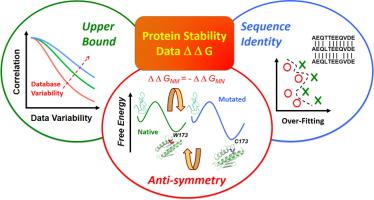Computational and Structural Biotechnology Journal ( IF 4.4 ) Pub Date : 2020-07-24 , DOI: 10.1016/j.csbj.2020.07.011 Tiziana Sanavia 1 , Giovanni Birolo 1 , Ludovica Montanucci 2 , Paola Turina 3 , Emidio Capriotti 3 , Piero Fariselli 1

|
Protein stability predictions are becoming essential in medicine to develop novel immunotherapeutic agents and for drug discovery. Despite the large number of computational approaches for predicting the protein stability upon mutation, there are still critical unsolved problems: 1) the limited and unbalanced number of thermodynamic measurements for proteins provided by current databases; 2) the large intrinsic variability of ΔΔG values due to different experimental conditions; 3) biases in the development of predictive methods caused by ignoring the anti-symmetry of ΔΔG between mutant and native protein forms; 4) over-optimistic prediction performance, due to sequence similarity between proteins used in training and test datasets. Here, we review these issues, highlighting new challenges required to improve current tools and to achieve more reliable predictions. In addition, we provide a perspective of how these methods will be beneficial for designing novel precision medicine approaches for several genetic disorders caused by mutations, such as cancer and neurodegenerative diseases.
中文翻译:

基于基因组变异的蛋白质稳定性预测的局限性和挑战:面向精密医学的未来应用。
蛋白质稳定性的预测已成为开发新型免疫治疗剂和开发药物的医学基础。尽管有大量的计算方法可以预测突变后蛋白质的稳定性,但仍然存在关键的未解决的问题:1)当前数据库提供的蛋白质热力学测量的数量有限且不平衡;2)由于不同的实验条件,ΔΔG值的内在变异性很大;3)由于忽略了突变体和天然蛋白形式之间的ΔΔG的反对称性,导致预测方法的发展存在偏差;4)由于用于训练和测试数据集的蛋白质之间的序列相似性,因此预测效果过分乐观。在这里,我们回顾这些问题,重点介绍了改进现有工具和实现更可靠的预测所需的新挑战。此外,我们提供了这些方法如何有益于设计针对由突变引起的几种遗传疾病(例如癌症和神经退行性疾病)的新型精密医学方法的观点。











































 京公网安备 11010802027423号
京公网安备 11010802027423号